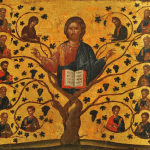
Grace perfects and then deifies nature, but only for those who cooperate with it. Grace does not impose itself on those with free will. Grace does not destroy. To remove the will and force someone to accept grace would leave someone less than what they were, for the will is a part of a person and so it must be sustained for the person to remain whole. This means that those who are cooperating with grace, but have yet to become perfected by it, have a will and can act in ways contrary to grace. Indeed, though someone could desire to cooperate with grace, they can find themselves challenged to do so because of their past habits and the pull of concupiscence. Thus, they can, despite what this wish, act contrary to their own perfection, and in doing so, tear down some of what grace has built up in them.
Grace does not support sin, and so Christ does not support sin. It is not the fault of grace, nor of Christ, that someone wills contrary to their own perfection and sins. Those who are being perfected can and often do relapse into sin. Neither Christ nor grace made them do such. Rather, when someone sins, Christ remains there with his love, offering those who sin grace, so that if and when they desire to be better, they can receive the grace which they need so that they can become the person they want to be. Even those who resist grace, those who do not cooperate with it, find themselves called by Christ to receive it. While they might for a resist grace for a long time, Christ continues to give them the chance to cooperate with it, and because of this they might eventually choose to accept grace, cooperate with it, and become the person they could and should be. If Christ did not offer his grace to them, then he would, in that way, stand in the way of their perfection and could be said then to support sin, because he would have taken away their chance for reformation.
What is important, then, is for us to realize that without grace, our imperfections will get the best of us. Grace is necessary: we can’t be saved by our works alone. Nor can we assume that grace will save us merely because we believe in Christ. We must become one with Christ and that means we cannot remain an agent of sin. Grace allows for our justification, but if we don’t cooperate with it, we cannot and will not be justified. Paul, therefore, warned us that grace will not save us if we act against it, that is, if we allow ourselves to be agents of sin: “But if, in our endeavor to be justified in Christ, we ourselves were found to be sinners, is Christ then an agent of sin? Certainly not” (Gal 2:17 RSV). To cooperate with grace we must cut ourselves off from sin, crucifying ourselves with Christ, so that we can truly find ourselves as being united with Jesus and our lives in the glory of that unity. “I have been crucified with Christ; it is no longer I who live, but Christ who lives in me; and the life I now live in the flesh I live by faith in the Son of God, who loved me and gave himself for me” (Gal. 2:20 RSV).
We must desire the kingdom of God. We must be willing to cooperate with grace in order to experience it for ourselves. For it is clear that we can experience the kingdom of God for ourselves if we open ourselves up to grace and let it transform us. We can and should be deified by grace. Deification is a never-ending process, so that by it, our experience of the kingdom of God will become greater and greater the more grace has us partake of the divine nature and experience the divine life for ourselves.
Every experience of grace, even if it is just the experience of grace helping us overcome some sin our lives, is an experience of the kingdom of God. The more we experience grace, the more we experience the kingdom for ourselves. This allows us to say we already experience the kingdom of God, even if we still are not yet perfect and without sin, for we still find grace entering our lives, working for that needful perfection. But this is also why it is said that most of us have yet to experience the fullness of the kingdom of God. However, it is possible to cooperate with grace in such a way that we truly die to the self and finds ourselves fully joined with Christ, that is, it is possible for us to be perfected by grace even in our temporal existence, or at least find ourselves so near perfection that the imperfection is negligible. This is why it can be said that some will experience the full power of the kingdom of God in their lives.
Jesus said, “Truly, I say to you, there are some standing here who will not taste death before they see that the kingdom of God has come with power” (Mk. 9:1b RSV). While many interpret this as meaning he taught that there would be some who would continue to live until the Parousia, and it is probable most who heard Jesus say this (in one variation or another in his preaching), believed such an interpretation, we do not have to interpret it that we ourselves. Rather, we can see it indicating a truism which applies to all generations since the text was written, that within all generations, there will be some who have the potential to see and experience the full power of the kingdom of God within themselves before their death In other words, Jesus is offering all who follow him the hope that that it will be possible for them to truly follow after him, cooperate with grace, and find themselves so perfect that they will experience the full presence of the kingdom of God in their lives. Likewise, by the way he said this, it also suggests that many others will also experience later, that is, after death, so that if they do not experience the power and the glory of the kingdom of God in their temporal existence, they can still receive and experience in eternity.
We must, therefore, put ourselves on the side of grace; when we find ourselves faltering, when we find ourselves sinning, we know it is not because of grace. Because grace is a free gift being offered to us, even after we sin, we can still receive it; that is, we can still open ourselves up to God and ask for forgiveness. To activate it in our lives, we must make the effort to cooperate with it. If we do not, then the grace which receive will not be able to achieve all the good which it otherwise has the potential to achieve in our lives. Thus, insofar as we resist grace, we will not be able to experience the glory which it can give to us. This can also explain why we often find ourselves experiencing life as if the glory of God is not there beside us. It is not because that glory is not there, that God is not at working, offering us all we need to receive that glory; it is because we have become so attached to ourselves and our ways we do not open ourselves up to that grace and experience what it has to offer. This is why Jesus said that if we want to follow him, we must pick up our cross and die to the self. When we cut ourselves off from those attachments which hinder our reception of grace, we will begin to see and experience the coming of the kingdom of God and its glory for ourselves.
Stay in touch! Like A Little Bit of Nothing on Facebook.
If you liked what you read, please consider sharing it with your friends and family!
















